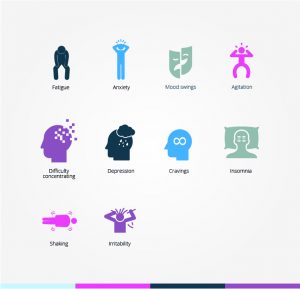Cocaine Withdrawal
While there’s still much disagreement in the scientific community regarding the nature and causes of cocaine addiction, in general, symptoms of cocaine withdrawal consist of: Anxiety. Loud, raspy snorting. Crash. Slurred speech.
Other common symptoms of cocaine withdrawal that may surface include restlessness, irritability, depression, craving for medications, cravings for food, and loss of appetite. These feelings generally begin to appear around four to six weeks after stopping cocaine use, although many individuals experience cravings up to nine months after ceasing use. In addition to these initial symptoms, many individuals suffering from cocaine withdrawal will experience secondary cravings for specific medications (e.g., heroin, prescription pain killers). These cravings usually diminish once medications are taken over a period of time but will occasionally return.
When cocaine use is stopped, most people experience some degree of relapse. However, relapse is not inevitable; if you take care of yourself, your physical symptoms will probably abate, even disappear. The key to overcoming cocaine withdrawal symptoms is taking care of your mind, which includes developing a plan for getting through the “rough patch” associated with ceasing usage. This period typically lasts anywhere from a few days to a week, and during this time, you may feel anything from sadness to boredom.

What Are the Symptoms of Cocaine Withdrawal?
For many people experiencing intense cravings, it’s important to associate negative feelings like sadness or boredom with these triggers. A simple method for dealing with these feelings like boredom is to simply walk around a bit, get some exercise, do some breathing exercises, or engage in an activity like yoga. Alternatively, you can try to find something enjoyable to do, like going out to dinner with friends, or going for a jog. Exercising will help elevate your energy levels and help you get rid of the negative feelings associated with cocaine withdrawal.
Along with exercising and eating properly to relieve your cravings, it’s also important to supplement your mental health treatment with anti-depressant or anti-anxiety medications. Sometimes the cravings are so strong that your brain will not be receptive to normal anti-depressants or anxiety medications. In this case, you need to supplement with additional medications that are designed to treat the symptoms specific to cocaine withdrawal symptoms.
Many people who experience cocaine withdrawal symptoms tend to become depressed, anxious, and irritable. It is very common for them to turn to self-medication in an attempt to make the symptoms less noticeable or even eliminate them completely. However, these medications carry inherent risks like drug addiction and side effects, so it is always recommended that you talk to your doctor before you start using them. If you are experiencing cravings but are not depressed, anxious, or depressed, chances are you are not dependent on cocaine.